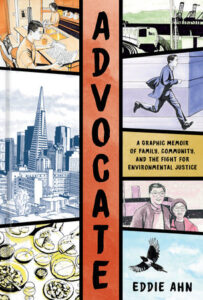subtitled A Graphic Memoir Of Family, Community, And The Fight For Environmental Justice.
 As a grossly overscheduled person myself, I would genuinely like to know where Eddie Ahn finds the time and energy for everything he does! A day job, volunteer work and a cartooning career? I was both impressed and secretly comforted reading this book, knowing that there really are other people as overextended as I am who, crucially, aren’t just doing things for the money.
As a grossly overscheduled person myself, I would genuinely like to know where Eddie Ahn finds the time and energy for everything he does! A day job, volunteer work and a cartooning career? I was both impressed and secretly comforted reading this book, knowing that there really are other people as overextended as I am who, crucially, aren’t just doing things for the money.
And don’t get me wrong, money is great! I would 100% welcome more of it into my life. When Eddie’s student debt was cleared, I cheered! But unlike the parents of Eddie’s generation, I would far rather have a practical minivan that requires minimal upkeep than an expensive, cash-draining status symbol Mercedes. It’s so strange: sometimes I wonder whether the social gains we’ve made as a culture, valuing positivity and kindness over shame and being mean, have any relation to the increasing micronization of economic effort, with gig and hustle culture becoming far more prevalent as late-stage capitalism keeps driving its wedge between capital and labor.
That’s not the point of this quiet, thoughtful graphic novel, tho it certainly examines the different attitudes of generations of Asian immigrants and their American-born kids. Eddie’s parents came to Texas from South Korea for grad school, but realized that the fastest way to make money was to open a liquor store. Eddie grew up believing that he had to get a lucrative professional career in order to repay his parents’ sacrifices — tho a large part of me is all, “Yeah, no, they moved to Texas for themselves, it’s not like they were fleeing abject poverty or danger.” Tho maybe they were and it just didn’t come across in this book! The whole Asian mindset of kids needing to smother their own needs and desires so that their parents can impress their peers just irritates the crap out of me, and I say that as an Asian parent myself.
This tension between his parents’ expectations and his own desires to work in the poorly paying fields of immigrant aid and environmental justice understandably form a large part of this memoir. Eddie’s anecdotes are often humorous, but poignancy is really the mood that permeates this graphic novel, as he struggles to get his parents to place more value on the non-material signifiers of his life. It’s perhaps a little ironic that the way he most deprograms himself of the need for material gain is through playing fairly high-stakes poker. The chapters where he worries about money, not only for himself but for his work, are deeply absorbing.
And maybe this is due to my own Asian heritage filling in the gaps of his backstory, but the parts that I found the most interesting but thought needed more fleshing out were the bits about environmental justice. Advocate reads like it was written for those who have a greater familiarity with his field than I do. I wanted to know more about his policy work, about what the environmental sensors they placed were meant to monitor, about how an environmental justice nonprofit wound up setting up job training programs and delivering meals to the elderly. I also wanted to read more of his thoughts on all the travel he had to do and, correspondingly, all the fossil fuels he had to consume while crisscrossing the state and country. That said, I definitely thought it was silly that he even questioned burning gas while delivering food to the needy in his city. Sure his car emissions might contribute to the eventual destruction of the planet, but not bringing food and checking in on the vulnerable is a far swifter, more certain and more easily avoidable death sentence for those who need the meals.
That bit was one of the few times where he let theory even remotely get in the way of actually helping people in need. For the most part, he does an excellent job of highlighting the realities of environmental justice for those who are poor a/o in minority groups. I 100% felt his pain when dealing with (rich) people who are like “you should just trade your car in for an EV.” He’s too polite to say, “bitch, with what money?!” I wish there’d been more about that class tension in his book.
One thing I did unreservedly love was his art. I love how candid he is in talking about it, and how modest, when his art is really unreservedly good. I especially adored the choices he used in coloring the panels. His clever use of tint allowed him to spotlight different places and eras on the same page without dropping any of the narrative threads, and let him tie them all together to show how so many things — his background, his passions, modern politics and current events — affect one another, even if they look like completely separate topics.
That said, I almost wish that this had been several different books, each with a different spotlight. The stuff about Asian culture was old hat to me, but will likely strike a chord with younger readers trying to figure their own ways out from underneath stifling expectations. His struggles as a young professional made for absorbing reading, but I really did want to read more about his advocacy work in this same relaxed, illustrated manner. Hopefully, there will be more, and more streamlined, graphic novels in Mr Ahn’s future.
Advocate by Eddie Ahn was published April 16 2024 by Ten Speed Graphic and is available from all good booksellers, including
